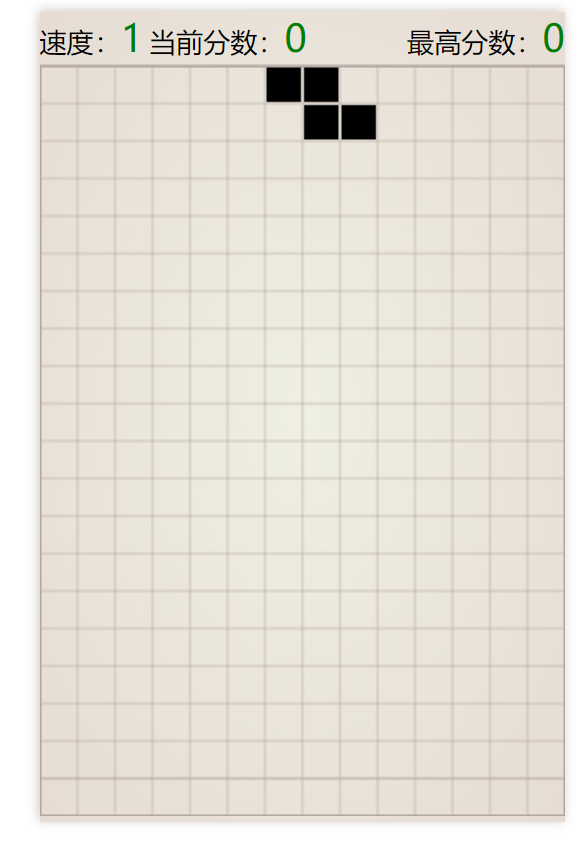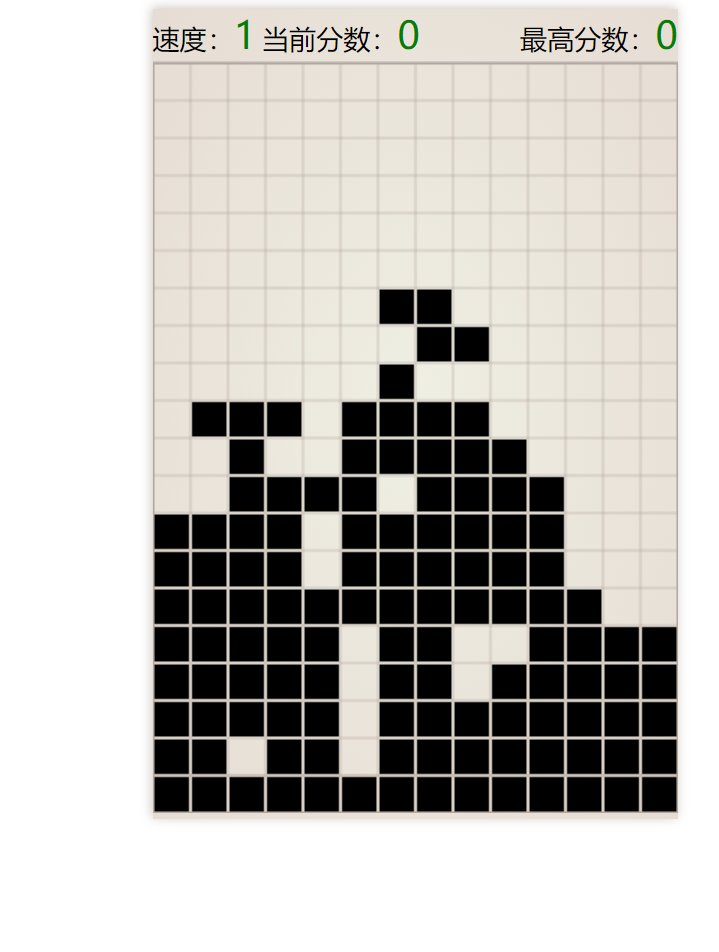STEP ONE:定义相关游戏变量
好了,让我们打开GameCanvas文件,在data中加入如下变量。
NO_BLOCK: 0, HAVE_BLOCK: 1, tetris_status: null, currentFall: null
其中,tetris_status是存放地图上方块有无的数组,NO_BLOCK是没有方块的状态,HAVE_BLOCK是有方块的状态。如果你想设计五颜六色的 方块,可以添加相应的变量,我们这里为了简单起见,只有一种颜色的方块。currentFall存储正在掉落的方块。
然后再用computed定义我们的几种方块。
computed: { // 定义几种可能出现的方块组合 blockArr: function () { return [ // Z [ {x: this.TETRIS_COLS / 2 - 1, y: 0}, {x: this.TETRIS_COLS / 2, y: 0}, {x: this.TETRIS_COLS / 2, y: 1}, {x: this.TETRIS_COLS / 2 + 1, y: 1} ], // 反Z [ {x: this.TETRIS_COLS / 2 + 1, y: 0}, {x: this.TETRIS_COLS / 2, y: 0}, {x: this.TETRIS_COLS / 2, y: 1}, {x: this.TETRIS_COLS / 2 - 1, y: 1} ], // 田 [ {x: this.TETRIS_COLS / 2 - 1, y: 0}, {x: this.TETRIS_COLS / 2, y: 0}, {x: this.TETRIS_COLS / 2 - 1, y: 1}, {x: this.TETRIS_COLS / 2, y: 1} ], // L [ {x: this.TETRIS_COLS / 2 - 1, y: 0}, {x: this.TETRIS_COLS / 2 - 1, y: 1}, {x: this.TETRIS_COLS / 2 - 1, y: 2}, {x: this.TETRIS_COLS / 2, y: 2} ], // J [ {x: this.TETRIS_COLS / 2, y: 0}, {x: this.TETRIS_COLS / 2, y: 1}, {x: this.TETRIS_COLS / 2, y: 2}, {x: this.TETRIS_COLS / 2 - 1, y: 2} ], // □□□□ [ {x: this.TETRIS_COLS / 2, y: 0}, {x: this.TETRIS_COLS / 2, y: 1}, {x: this.TETRIS_COLS / 2, y: 2}, {x: this.TETRIS_COLS / 2, y: 3} ], // ┴ [ {x: this.TETRIS_COLS / 2, y: 0}, {x: this.TETRIS_COLS / 2 - 1, y: 1}, {x: this.TETRIS_COLS / 2, y: 1}, {x: this.TETRIS_COLS / 2 + 1, y: 1} ] ] } }
这样我们新生成的方块就能在地图最顶上的中间出现。
定义了变量,接下来让我们初始化他们。
在mounted()方法里,我们在最后加上这一句:this.newGame()
然后我们在methods里定义newGame()
initData () { this.tetris_status = [] for (let i = 0; i < this.TETRIS_ROWS; i++) { this.tetris_status[i] = [] for (let j = 0; j < this.TETRIS_COLS; j++) { this.tetris_status[i][j] = this.NO_BLOCK } } }
以上。
STEP TWO:方块生成。
首先,每次刷新都要重新绘制方块的位置,我们将其放在drawBlocks里面。
drawBlocks () { // 清空地图 for (let i = 0; i < this.TETRIS_ROWS; i++) { for (let j = 0; j < this.TETRIS_COLS; j++) { this.canvasCtx.clearRect(j * this.CELL_SIZE + 1, i * this.CELL_SIZE + 1, this.CELL_SIZE - 2, this.CELL_SIZE - 2) } } // 绘制地图 for (let i = 0; i < this.TETRIS_ROWS; i++) { for (let j = 0; j < this.TETRIS_COLS; j++) { if (this.tetris_status[i][j] !== this.NO_BLOCK) { this.canvasCtx.fillRect(j * this.CELL_SIZE + 1, i * this.CELL_SIZE + 1, this.CELL_SIZE - 2, this.CELL_SIZE - 2)// 中间留点缝隙 } } } // 绘制currentFall for (let i = 0; i < this.currentFall.length; i++) { this.canvasCtx.fillRect(this.currentFall[i].x * this.CELL_SIZE + 1, this.currentFall[i].y * this.CELL_SIZE + 1, this.CELL_SIZE - 2, this.CELL_SIZE - 2) } }
现在方块可以绘制了。但——没有方块啊!
那就创建方块!
createBlock () { var rand = Math.floor(Math.random() * this.blockArr.length) // 随机生成正在下掉的方块 this.currentFall = [ {x: this.blockArr[rand][0].x, y: this.blockArr[rand][0].y}, {x: this.blockArr[rand][1].x, y: this.blockArr[rand][1].y}, {x: this.blockArr[rand][2].x, y: this.blockArr[rand][2].y}, {x: this.blockArr[rand][3].x, y: this.blockArr[rand][3].y} ]
}
然后我们先做个小测试。
往我们的newGame()里添加
this.createBlock() this.drawBlocks()
然后打开我们的localhost:8080

好了,我们的方块生成也成功了!
STEP THREE:编写游戏逻辑
方块有了,是时候让他们动起来了 !
// judge can move down and if touch others or arrive at the bottom then return true, else return false moveDown () { for (let i = 0; i < this.currentFall.length; i++) { if (this.currentFall[i].y >= this.TETRIS_ROWS - 1 || this.tetris_status[this.currentFall[i].y + 1][this.currentFall[i].x] !== this.NO_BLOCK) { // 记录block for (let i = 0; i < this.currentFall.length; i++) { this.tetris_status[this.currentFall[i].y][this.currentFall[i].x] = this.HAVE_BLOCK } // 判断有没有满行的 for (let j = 0; j < this.currentFall.length; j++) { for (let i = 0; i < this.TETRIS_COLS; i++) { if (this.tetris_status[this.currentFall[j].y][i] === this.NO_BLOCK) { break } // 最后一行满了 if (i === this.TETRIS_COLS - 1) { // 消除最后一行 for (let i = this.currentFall[j].y; i > 0; i--) { for (let j = 0; j < this.TETRIS_COLS; j++) { this.tetris_status[i][j] = this.tetris_status[i - 1][j] } } } } } return true } } for (let i = 0; i < this.currentFall.length; i++) { this.currentFall[i].y += 1 } this.drawBlocks() return false }, // 右移 moveRight () { for (let i = 0; i < this.currentFall.length; i++) { if (this.currentFall[i].x + 1 >= this.TETRIS_ROWS || this.tetris_status[this.currentFall[i].y][this.currentFall[i].x + 1] !== this.NO_BLOCK) { return } } for (let i = 0; i < this.currentFall.length; i++) { this.currentFall[i].x++ } this.drawBlocks() }, // 左移 moveLeft () { for (let i = 0; i < this.currentFall.length; i++) { if (this.currentFall[i].x < 1 || this.tetris_status[this.currentFall[i].y][this.currentFall[i].x - 1] !== this.NO_BLOCK) { return } } for (let i = 0; i < this.currentFall.length; i++) { this.currentFall[i].x-- } this.drawBlocks() }, // 旋转 rotate () { // 定义记录能否旋转的旗标 var canRotate = true for (var i = 0; i < this.currentFall.length; i++) { var preX = this.currentFall[i].x var preY = this.currentFall[i].y // 始终以第三个方块作为旋转的中心, // i == 2时,说明是旋转的中心 if (i !== 2) { // 计算方块旋转后的x、y坐标 var afterRotateX = this.currentFall[2].x + preY - this.currentFall[2].y var afterRotateY = this.currentFall[2].y + this.currentFall[2].x - preX // 如果旋转后所在位置已有方块,表明不能旋转 if (this.tetris_status[afterRotateY][afterRotateX + 1] !== this.NO_BLOCK) { canRotate = false break } // 如果旋转后的坐标已经超出了最左边边界 if (afterRotateX < 0 || this.tetris_status[afterRotateY - 1][afterRotateX] !== this.NO_BLOCK) { this.moveRight() afterRotateX = this.currentFall[2].x + preY - this.currentFall[2].y afterRotateY = this.currentFall[2].y + this.currentFall[2].x - preX break } if (afterRotateX < 0 || this.tetris_status[afterRotateY - 1][afterRotateX] !== this.NO_BLOCK) { this.moveRight() break } // 如果旋转后的坐标已经超出了最右边边界 if (afterRotateX >= this.TETRIS_COLS - 1 || this.tetris_status[afterRotateY][afterRotateX + 1] !== this.NO_BLOCK) { this.moveLeft() afterRotateX = this.currentFall[2].x + preY - this.currentFall[2].y afterRotateY = this.currentFall[2].y + this.currentFall[2].x - preX break } if (afterRotateX >= this.TETRIS_COLS - 1 || this.tetris_status[afterRotateY][afterRotateX + 1] !== this.NO_BLOCK) { this.moveLeft() break } } } if (canRotate) { for (var j = 0; j < this.currentFall.length; j++) { preX = this.currentFall[j].x preY = this.currentFall[j].y if (j !== 2) { this.currentFall[j].x = this.currentFall[2].x + preY - this.currentFall[2].y this.currentFall[j].y = this.currentFall[2].y + this.currentFall[2].x - preX } } this.drawBlocks() } }
这四个方法,只有moveDown有点特殊,它有返回值。如果碰到了别的方块的顶部,或者到了最底下,那么就返回true,否则,返回false。
然后我们就可以封装一个方法next。
为了让GameCanvas仅实现游戏地图的绘制,我们将定时下移的方法定义在Index.vue里。
1 next () { // 方块下移 2 if (this.$refs.gameCanvas.moveDown()) { 3 // 判断是否触顶 4 for (let i = 0; i < this.$refs.gameCanvas.currentFall.length; i++) { 5 if (this.$refs.gameCanvas.currentFall[i].y === 0) { 6 // gameEnd() 7 return 8 } 9 } 10 // 新的block 11 this.$refs.gameCanvas.createBlock() 12 } 13 }
在第二行里我们调用了gameCanvas里的moveDown()。
为了实现这一点,我们要对Index.vue里的html代码做一点修改。
将<game-canvas></game-canvas>改为<game-canvas ref="gameCanvas"></game-canvas>
这样就好了!
然后让我们在这个文件里也创建一个newGame方法。
newGame () { this.curScore = 0 this.curSpeed = 1 this.$refs.gameCanvas.newGame()// 调用gameCanvas里的newGame }
同时在mounted里调用它。
mounted () { this.newGame() }
然后让我们把gameCanvas里mounted里的this.newGame()删掉。
这样我们的newGame方法就封装好了。之后新建游戏就只需要调用Index里的newGame了!
最后,我们可以开始编写方向键移动了。
在mounted方法里,我们绑定事件监听。
document.onkeydown = ({ keyCode }) => {
switch (keyCode) {
// 向下
case 40:// ↓
case 83:// S
this.next()
break
// 向左
case 37:// ←
case 65:// A
this.$refs.gameCanvas.moveLeft()
break
// 向右
case 39:// →
case 68:// D
this.$refs.gameCanvas.moveRight()
break
// 旋转
case 38:// ↑
case 87:// W
this.$refs.gameCanvas.rotate()
break
}
}
ok!
只剩定时下移了。
让我们在data里定义一个timer,并在newGame里为他赋值。

详细代码我已经传到github上了,大家有兴趣的可以去看一下。

PS:我弟今天玩的时候发现出了一个bug:会在按下的时候方块会重叠。不过是偶然出现,目前仍未找到原因。大家如果有什么想法的可以在下面评论,或者发邮件到1179713734@qq.com